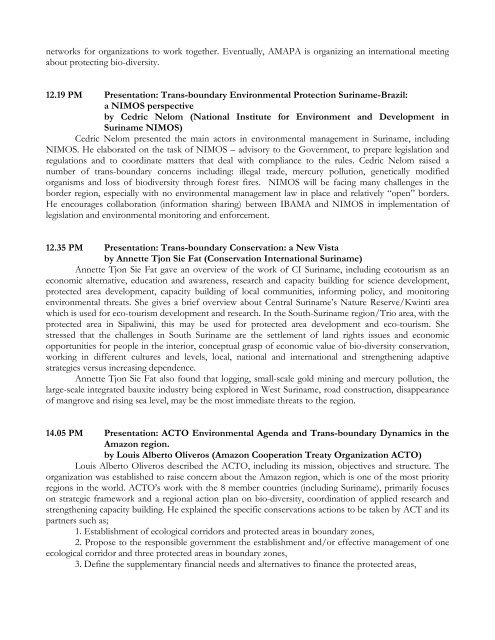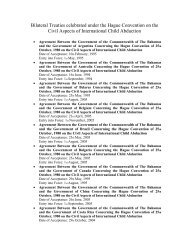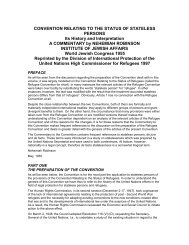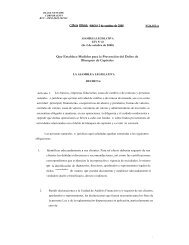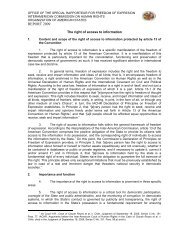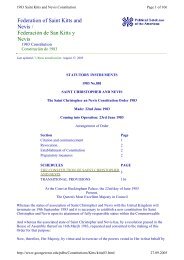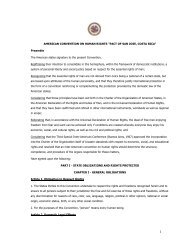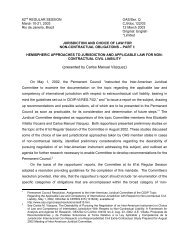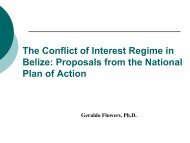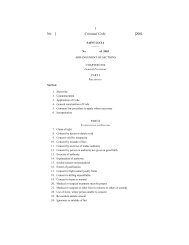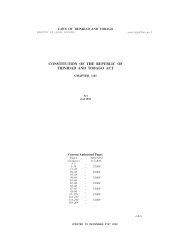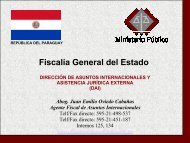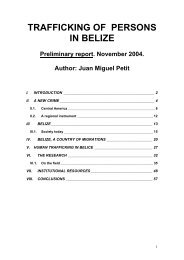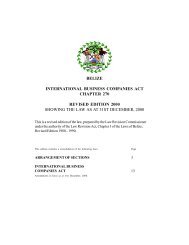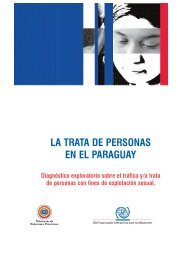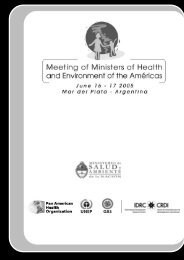Transboundary meeting on environmental protection
Transboundary meeting on environmental protection
Transboundary meeting on environmental protection
Create successful ePaper yourself
Turn your PDF publications into a flip-book with our unique Google optimized e-Paper software.
networks for organizati<strong>on</strong>s to work together. Eventually, AMAPA is organizing an internati<strong>on</strong>al <str<strong>on</strong>g>meeting</str<strong>on</strong>g><br />
about protecting bio-diversity.<br />
12.19 PM Presentati<strong>on</strong>: Trans-boundary Envir<strong>on</strong>mental Protecti<strong>on</strong> Suriname-Brazil:<br />
a NIMOS perspective<br />
by Cedric Nelom (Nati<strong>on</strong>al Institute for Envir<strong>on</strong>ment and Development in<br />
Suriname NIMOS)<br />
Cedric Nelom presented the main actors in envir<strong>on</strong>mental management in Suriname, including<br />
NIMOS. He elaborated <strong>on</strong> the task of NIMOS – advisory to the Government, to prepare legislati<strong>on</strong> and<br />
regulati<strong>on</strong>s and to coordinate matters that deal with compliance to the rules. Cedric Nelom raised a<br />
number of trans-boundary c<strong>on</strong>cerns including: illegal trade, mercury polluti<strong>on</strong>, genetically modified<br />
organisms and loss of biodiversity through forest fires. NIMOS will be facing many challenges in the<br />
border regi<strong>on</strong>, especially with no envir<strong>on</strong>mental management law in place and relatively “open” borders.<br />
He encourages collaborati<strong>on</strong> (informati<strong>on</strong> sharing) between IBAMA and NIMOS in implementati<strong>on</strong> of<br />
legislati<strong>on</strong> and envir<strong>on</strong>mental m<strong>on</strong>itoring and enforcement.<br />
12.35 PM Presentati<strong>on</strong>: Trans-boundary C<strong>on</strong>servati<strong>on</strong>: a New Vista<br />
by Annette Tj<strong>on</strong> Sie Fat (C<strong>on</strong>servati<strong>on</strong> Internati<strong>on</strong>al Suriname)<br />
Annette Tj<strong>on</strong> Sie Fat gave an overview of the work of CI Suriname, including ecotourism as an<br />
ec<strong>on</strong>omic alternative, educati<strong>on</strong> and awareness, research and capacity building for science development,<br />
protected area development, capacity building of local communities, informing policy, and m<strong>on</strong>itoring<br />
envir<strong>on</strong>mental threats. She gives a brief overview about Central Suriname’s Nature Reserve/Kwinti area<br />
which is used for eco-tourism development and research. In the South-Suriname regi<strong>on</strong>/Trio area, with the<br />
protected area in Sipaliwini, this may be used for protected area development and eco-tourism. She<br />
stressed that the challenges in South Suriname are the settlement of land rights issues and ec<strong>on</strong>omic<br />
opportunities for people in the interior, c<strong>on</strong>ceptual grasp of ec<strong>on</strong>omic value of bio-diversity c<strong>on</strong>servati<strong>on</strong>,<br />
working in different cultures and levels, local, nati<strong>on</strong>al and internati<strong>on</strong>al and strengthening adaptive<br />
strategies versus increasing dependence.<br />
Annette Tj<strong>on</strong> Sie Fat also found that logging, small-scale gold mining and mercury polluti<strong>on</strong>, the<br />
large-scale integrated bauxite industry being explored in West Suriname, road c<strong>on</strong>structi<strong>on</strong>, disappearance<br />
of mangrove and rising sea level, may be the most immediate threats to the regi<strong>on</strong>.<br />
14.05 PM Presentati<strong>on</strong>: ACTO Envir<strong>on</strong>mental Agenda and Trans-boundary Dynamics in the<br />
Amaz<strong>on</strong> regi<strong>on</strong>.<br />
by Louis Alberto Oliveros (Amaz<strong>on</strong> Cooperati<strong>on</strong> Treaty Organizati<strong>on</strong> ACTO)<br />
Louis Alberto Oliveros described the ACTO, including its missi<strong>on</strong>, objectives and structure. The<br />
organizati<strong>on</strong> was established to raise c<strong>on</strong>cern about the Amaz<strong>on</strong> regi<strong>on</strong>, which is <strong>on</strong>e of the most priority<br />
regi<strong>on</strong>s in the world. ACTO’s work with the 8 member countries (including Suriname), primarily focuses<br />
<strong>on</strong> strategic framework and a regi<strong>on</strong>al acti<strong>on</strong> plan <strong>on</strong> bio-diversity, coordinati<strong>on</strong> of applied research and<br />
strengthening capacity building. He explained the specific c<strong>on</strong>servati<strong>on</strong>s acti<strong>on</strong>s to be taken by ACT and its<br />
partners such as;<br />
1. Establishment of ecological corridors and protected areas in boundary z<strong>on</strong>es,<br />
2. Propose to the resp<strong>on</strong>sible government the establishment and/or effective management of <strong>on</strong>e<br />
ecological corridor and three protected areas in boundary z<strong>on</strong>es,<br />
3. Define the supplementary financial needs and alternatives to finance the protected areas,


